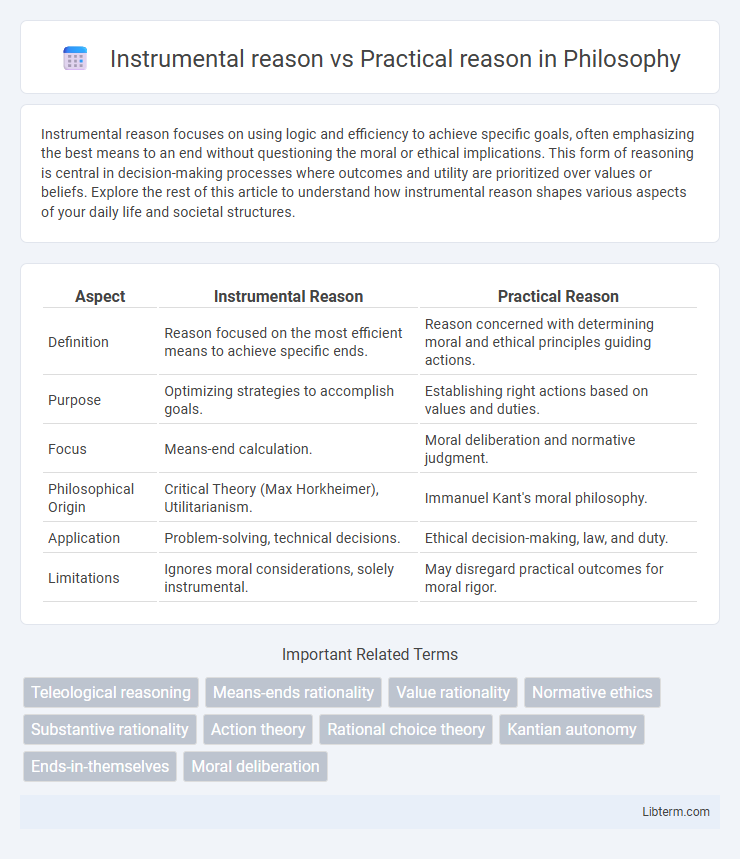Instrumental reason focuses on using logic and efficiency to achieve specific goals, often emphasizing the best means to an end without questioning the moral or ethical implications. This form of reasoning is central in decision-making processes where outcomes and utility are prioritized over values or beliefs. Explore the rest of this article to understand how instrumental reason shapes various aspects of your daily life and societal structures.
Table of Comparison
| Aspect | Instrumental Reason | Practical Reason |
|---|---|---|
| Definition | Reason focused on the most efficient means to achieve specific ends. | Reason concerned with determining moral and ethical principles guiding actions. |
| Purpose | Optimizing strategies to accomplish goals. | Establishing right actions based on values and duties. |
| Focus | Means-end calculation. | Moral deliberation and normative judgment. |
| Philosophical Origin | Critical Theory (Max Horkheimer), Utilitarianism. | Immanuel Kant's moral philosophy. |
| Application | Problem-solving, technical decisions. | Ethical decision-making, law, and duty. |
| Limitations | Ignores moral considerations, solely instrumental. | May disregard practical outcomes for moral rigor. |
Understanding Instrumental Reason
Instrumental reason involves using logic and analysis to identify the most efficient means to achieve specific goals, emphasizing optimization and utility. It is primarily concerned with the technical calculation of cause and effect, focusing on how actions lead to desired outcomes. Understanding instrumental reason requires recognizing its role in decision-making processes where success is measured by effectiveness rather than ethical or moral considerations.
Defining Practical Reason
Practical reason refers to the cognitive process focused on deliberation about actions aligned with moral values, goals, and human well-being, emphasizing what ought to be done rather than mere means to an end. Unlike instrumental reason, which concerns efficiency and selecting the best means to achieve given ends, practical reason involves normative evaluation and ethical judgment embedded in decision-making. It serves as the foundation for ethical theories and moral philosophy by guiding actions through principles, intentions, and the pursuit of the good life.
Historical Origins of Instrumental and Practical Reason
Instrumental reason emerged prominently during the Enlightenment, emphasizing efficiency and the optimization of means to achieve specific ends, largely shaped by figures like Francis Bacon and later formalized by Max Weber. Practical reason, rooted in Aristotelian philosophy, focuses on ethical deliberation and the discernment of appropriate ends based on human values and moral considerations, tracing back to Aristotle's notion of phronesis or practical wisdom. The historical tension between these concepts reflects the shift from classical ethical reasoning to modern techno-scientific rationality in Western thought.
Key Differences: Instrumental vs Practical Reason
Instrumental reason focuses on the most efficient means to achieve a specific goal, emphasizing calculation and utility in decision-making processes. Practical reason, however, involves evaluating the morality and desirability of the ends themselves, guiding choices based on ethical considerations and overall values. Key differences lie in instrumental reason's goal-oriented efficiency versus practical reason's reflective judgment on the worth and implications of those goals.
Role of Goals in Instrumental Reason
Instrumental reason centers on selecting the most efficient means to achieve predefined goals, emphasizing the optimization of actions based on desired outcomes. Goals serve as fixed endpoints guiding decision-making processes, where the primary concern is the effectiveness of tools and methods to attain those objectives. In contrast, practical reason involves evaluating and justifying the goals themselves, often incorporating ethical or normative considerations beyond mere efficiency.
The Influence of Values in Practical Reason
Practical reason is deeply influenced by values, guiding decision-making based on moral and ethical considerations rather than mere efficiency or means-end calculations typical of instrumental reason. Values shape the goals and norms that practical reason seeks to realize, embedding purpose and meaning into actions beyond technical optimization. This interplay highlights how practical reason integrates subjective values to determine right conduct, contrasting with the value-neutral focus of instrumental reason.
Philosophical Debates Surrounding the Two Concepts
Philosophical debates surrounding instrumental reason versus practical reason revolve around their differing emphases on means versus ends, where instrumental reason is valued for its efficiency in achieving specific goals, while practical reason is debated as a guiding principle for morally and ethically appropriate action. Thinkers like Kant critique instrumental reason for its potential to treat humans as mere means, emphasizing practical reason's role in respecting autonomy and universal moral laws. Contemporary discourse explores how these concepts influence decision-making in ethics, politics, and technology, assessing the balance between calculative logic and normative reasoning.
Instrumental Reason in Modern Decision-Making
Instrumental reason in modern decision-making prioritizes efficiency and goal achievement by selecting the most effective means to achieve predetermined ends, often leveraging data analytics and algorithmic processes to optimize outcomes. It emphasizes quantifiable metrics, cost-benefit analysis, and predictive modeling to guide choices in business, technology, and policy environments. This approach contrasts with practical reason, which incorporates ethical considerations, values, and contextual judgment beyond mere instrumental effectiveness.
Practical Reason in Ethical Judgments
Practical reason in ethical judgments involves assessing actions based on moral principles and values rather than mere efficiency or means to an end, distinguishing it from instrumental reason which focuses on the most effective way to achieve a goal. It guides decision-making by emphasizing duties, rights, and the intrinsic worth of individuals, helping to determine what ought to be done in complex moral situations. Ethical frameworks such as Kantian ethics rely heavily on practical reason to evaluate the morality of actions independent of their consequences.
Implications for Everyday Life and Society
Instrumental reason drives individuals to choose means that efficiently achieve specific ends, often prioritizing cost-benefit calculations and measurable outcomes, which can lead to a focus on productivity and technological advancement in everyday life. Practical reason involves reflecting on values, ethics, and broader purposes, guiding decisions that consider moral implications and long-term societal well-being. The dominance of instrumental reason in society can result in utilitarian approaches to problem-solving, potentially neglecting human values and social justice, while emphasizing practical reason encourages more holistic and ethically grounded choices in personal and public domains.
Instrumental reason Infographic

 libterm.com
libterm.com